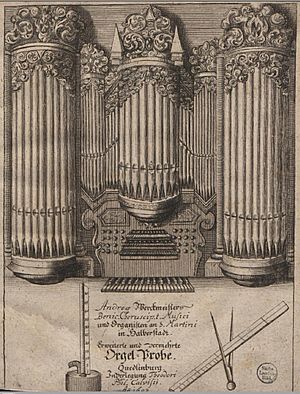Andreas Werckmeister facts for kids
Andreas Werckmeister (born November 30, 1645 – died October 26, 1706) was a German musician. He was an organist, a music theorist (someone who studies how music works), and a composer. He lived during the Baroque era, a time when music was often grand and fancy. Werckmeister was one of the first people to strongly support a tuning system called equal temperament. This system made music sound more balanced and helped shape almost all Western music that came after him.
Life
Andreas Werckmeister was born in Benneckenstein, Germany. He went to schools in Nordhausen and Quedlinburg. His uncles, Heinrich Christian Werckmeister and Heinrich Victor Werckmeister, taught him about music.
In 1664, he became an organist in Hasselfelde. Ten years later, he moved to Elbingerode to play the organ there. In 1696, he became the organist at the Martinskirche in Halberstadt. He passed away in Halberstadt.
Musical Compositions
Not many of Werckmeister's musical pieces still exist today. One booklet of his compositions remains. It contains pieces for the violin with basso continuo (a type of musical accompaniment). This booklet is called Musikalische Privatlust and was published in 1689.
Some of his organ works also remain. These include:
- Canzon in A-minor
- Canzona in D-minor
- Praeludium ex G
- Canzonetta in D-major
Ideas About Music
Werckmeister is most famous today for his ideas about music. He wrote books like Musicae mathematicae hodegus curiosus... (1687) and Musikalische Temperatur (1691). In these books, he described a special way of tuning musical instruments. We now call this system Werckmeister temperament. It is a type of "well temperament," which is a tuning system that makes all keys sound good. This idea was later used by Johann Sebastian Bach in his famous work, "The Well-Tempered Clavier."
Werckmeister's writings were well known to other famous composers, including Johann Sebastian Bach. Werckmeister believed that well-made counterpoint (a way of combining different melodies) was connected to the orderly movements of the planets. This idea was similar to what Kepler wrote in his book Harmonice Mundi. Werckmeister saw music as a reflection of God's work. Even though he focused on counterpoint, his work also highlighted the important rules of harmony (how different notes sound good together).
List of Works
- Musicae mathematicae hodegus curiosus... (1687)
- Musikalische Temperatur, oder... (1691)
- Der Edlen Music-Kunst... (1691)
- Hypomnemata musica (1697)
- Erweierte und verbesserte Orgel-Probe (1698)
- Die nothwendigsten Anmerckungen und Reglen, wie der Bassus continuus... (1698)
- Cribrum musicum (1700)
- Harmonologia musica (1702)
- Musikalische Paradoxal-Discourse (1707)
See Also
 In Spanish: Andreas Werckmeister para niños
In Spanish: Andreas Werckmeister para niños
- Werckmeister Harmonies
 | Isaac Myers |
 | D. Hamilton Jackson |
 | A. Philip Randolph |


